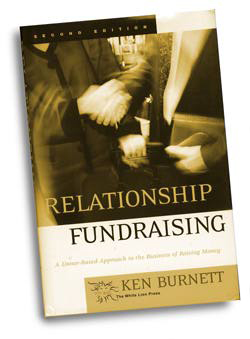- Home
- About Us
- The Team / Contact Us
- Books and Resources
- Privacy Policy
- Nonprofit Employer of Choice Award

 What do Harry Potter, reality TV, hybrid cars, Facebook, Twitter, mobile phones, digital cameras, the Euro and Relationship Fundraising have in common? None of those things existed twenty years ago. It is undeniable that the way people interact with each other and with their favourite charities, has significantly changed.
What do Harry Potter, reality TV, hybrid cars, Facebook, Twitter, mobile phones, digital cameras, the Euro and Relationship Fundraising have in common? None of those things existed twenty years ago. It is undeniable that the way people interact with each other and with their favourite charities, has significantly changed.
The idea of relationship fundraising has become so engrained in charitable culture it is very likely that fundraisers are no longer thinking about what it actually means. Are traditional fundraising practices helping donors engage with your cause in meaningful ways? How do donors want to relate to your charity? Do we even know?
Surely, if we were building strong relationships with donors, the retention rates wouldn’t be as dismal as they are. Only 4 donors out of every 10 renew their support. That is a retention rate of a mere 41%!
In theory the classic book by Ken Burnett, which serves as the pillar for truly great fundraisers, still makes a lot of sense. Treat donors with respect, report back to them, say “thank you”, and they will give again. But is it working? Is relationship fundraising still relevant. Do we really understand and agree on what relationship fundraising means?
New research underway
eNEWS welcomes, the first project to be undertaken by the fundraising think tank – Rogare – at Plymouth University’s Centre for Sustainable Philanthropy (CSP) in the UK aims to review and refashion the concept of ‘relationship fundraising’. This research will incorporate new developments in relationship marketing and the latest theories on relationship building from the fields of psychology and social psychology.
The project has six stages:
1) Canvass the views of senior practitioners on the definition, scope and current success of relationship fundraising techniques.
2) Collate evidence of what is currently considered best practice and case studies of success.
3) Conduct a thorough review of the academic and practitioner literature to identify theories, frameworks and ideas from the domain of relationship marketing that might be applied to fundraising.
4) Conduct a similar review of the domain of ‘relationship management’ in psychology and social psychology to identify theories, frameworks and ideas that that might be used to inform fundraising practice.
5) Based on the two literature reviews, assess the views of senior practitioners on the direction that relationship fundraising will take in the future and the challenges it must overcome.
6) Compile a final report that summarizes the learning from steps 1-5 and outlines the future direction that relationship fundraising might take.
Combining anecdote with social science
 Professor Adrian Sargeant, director of the CSP, says
Professor Adrian Sargeant, director of the CSP, says
“When Ken’s book Relationship Fundraising was first published in 1992, the science of relationship marketing had yet to really emerge and database technology was so poor that there were very real limitations on what could realistically be achieved. Fundraising was primarily reliant on direct mail and new digital channels were still only a dream. As a consequence the real utility of the relationship fundraising paradigm had yet to be explored.
“Fundraisers certainly have a general sense of what it might mean as a guiding philosophy, but no idea of the theories, tools or frameworks that could be guiding their approach, nor the results that might be achieved if they did so. This Rogare project aims to provide relationship fundraising with its theoretical foundation.”
Call for advisors
As a first step in this project, Rogare intends to assemble a panel of around 30 people who can assist the project by sharing their opinions (good and bad) on relationship fundraising, specifically:
a) their definitions of relationship fundraising
b) details of their relationship building practice
c) their thoughts on what relationship issues they are presently wrestling with, the thinking they have engaged in to manage these issues, and any lessons that have accrued as a consequence.
Anyone who would like to be considered for the panel should contact Rogare’s manager Ian MacQuillin by Friday 23 January.
International in scope, this work would not be possible without joint funding from Bloomerang and Pursuant Group.
With over two million people employed by the charitable sector in Canada and 7% of our gross domestic product derived from fundraising efforts, eNEWS will continue to watch this project closely and report outcomes with you as soon as we can.
To be continued…
Kimberley MacKenzie, Editor, eNEWS